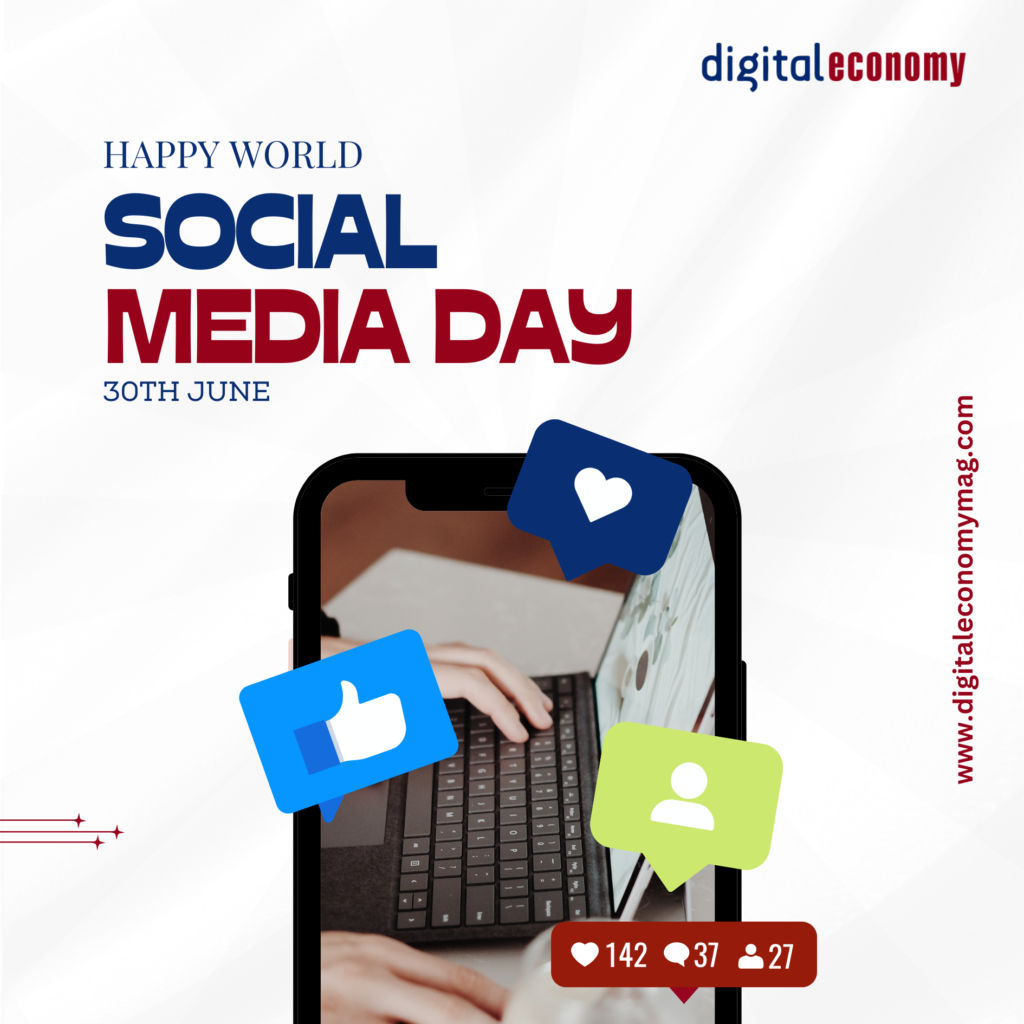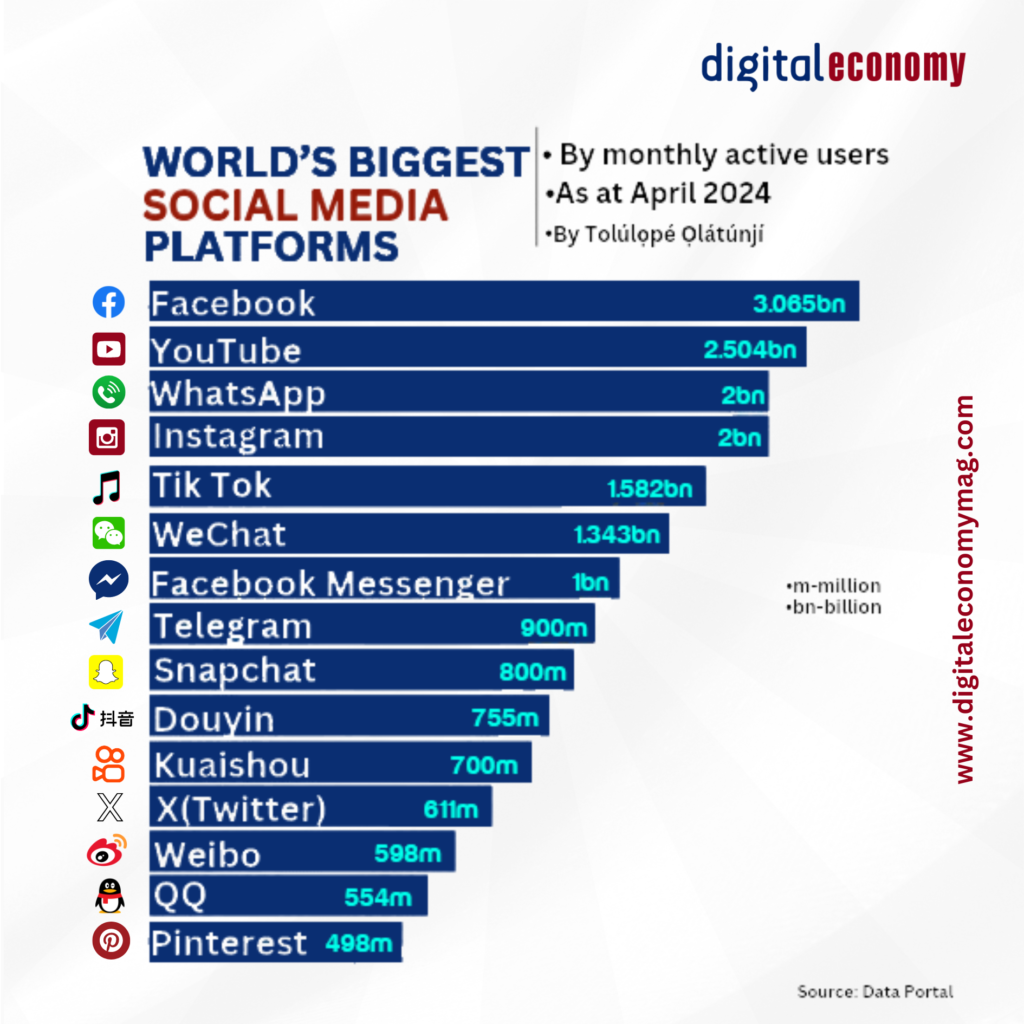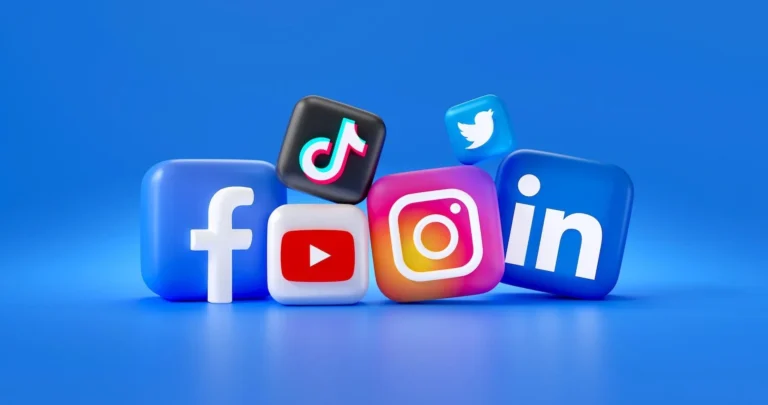In a globally connected epoch, social media is shaping lives constantly in Africa, and effortlessly bridging geographical divides. With its vibrant cultures and ever-evolving digital frontier, the continent is witnessing an immense transformation, via social media.
The most popular social media platforms in Africa today are Facebook, WhatsApp, X (formerly known as Twitter), Tik Tok and Snapchat. These platforms have spurred a digital revolution. People now create, share, exchange, and modify ideas that go viral just with a snap of the fingers in virtual communities.

The tool of social media has connected geographically separated people, enabled user-generated and interpersonal communication, fast and efficient communication, empowered society with an unrestricted flow of information, and facilitated online learning as well as work-related functions.
On the global stage, today, Mark Zuckerberg’s Facebook is the most used social media channel with over 3 billion active users. A report from the Data portal reveals that 16 per cent of the world’s social media population take Instagram as their favourite social medium. Instagram is owned by Meta, Mark Zuckerberg’s platform.
As of April 2024, the report states that there are over 5 billion social media users globally, 62 per cent of the World’s total population. It also reveals that the average social media user actively engages with or visits about 67 different social platforms each month and spends approximately 2 hours and 20 minutes per day on social media.
The World Population Review data shows Africa boasts the world’s second-largest social media population, exceeding 13 per cent. Only Asia, with 15 per cent, has a higher social media user base.
In April 2024, Statista rated Morrocco as the country with the highest number of active social media users at 55 per cent, followed by South Africa at 43 per cent and Egypt at 42 per cent. Kenya, Ghana, and Nigeria have the lowest social network penetration rates on the continent, with less than 25 per cent of the population accessing social media in each country.
Regionally, South Africa leads in social media penetration by 41 per cent, followed by North Africa at 40 per cent, West Africa at 15 per cent and East Africa at 10 per cent. The Central African region is at the base of the ranking with over a 9 per cent penetration rate.
Thanks to social media, African youths are connected with friends, family, and acquaintances through social media platforms like WhatsApp, Facebook, and Instagram among others. They share experiences regardless of their geographical locations, fostering a sense of connectivity beyond their immediate environments. It has become a practice for people to feel compelled to express their moods on social media constantly.
According to Data Portal, around 49% of social media users use these platforms to keep in touch with family and friends. This trend is most pronounced among those aged 55-64, with 55% using social media for this purpose, while 47% of users aged 16-24 do the same.
Moreover, the tool serves as a business platform, which presents a valuable opportunity for the youth of Africa. This involves publishing compelling content on social media profiles, engaging with followers, analyzing results, and running social media advertisements.
Social media marketing includes posting text, image updates, videos, and other content to drive audience engagement, as well as using paid social media advertising to attract interest in a product or service. Young entrepreneurs are leveraging social media platforms to promote their products and services at minimal cost.
Data from leading advertising platforms shows that YouTube has the largest social media advertising audience. YouTube ads reach 2.50 billion users per month, surpassing Facebook’s 2.24 billion. Instagram ranks third, reaching 1.69 billion users in April 2024. TikTok ads reach 1.58 billion users over 18 each month. LinkedIn reports an ad reach of 1.07 billion, though this reflects total registered members, not monthly active users.
African youths are showcasing their talents on social media, attracting fans and investors. Many African youths are also learning skills and trades via social media, which previously required paid seminars or educational institutions.
Furthermore, these skills include public speaking, cake making, dressmaking, hairstyling, event planning, and catering. Acquiring such knowledge boosts their confidence and independence. Additionally, many earn income from social media platforms like YouTube by creating popular educational or entertaining videos.

According to Statista, Advertising spending is projected to reach $1.1 billion in 2024. It is expected to grow at an annual rate (CAGR 2024-2028) of 4.28%, reaching $1.4 billion by 2028. Globally, the highest ad spending will be in the United States, totalling $76.4 billion in 2024. By 2028, mobile ad spending in the social media advertising market will account for $1.4 billion. The number of users in this market is expected to reach 687.4 million by 2028.
Indeed, social media is a valuable tool for driving development in Africa. Its effective use by the continent’s youth, who are the majority, is essential for achieving Africa’s Agenda 2063.
ALSO READ: PAYCORP REVOLUTIONIZES PAYMENT SOLUTIONS ACROSS CONTINENTS
By enabling youths to share ideas, innovations, and progressive views, social media can foster socio-economic growth. Africa’s youth, widely seen as the continent’s greatest potential but currently underutilized, can significantly accelerate development through the exchange of ideas. Social media serves as a reliable and promising platform to achieve this goal.
By Tolulope Olatunji




